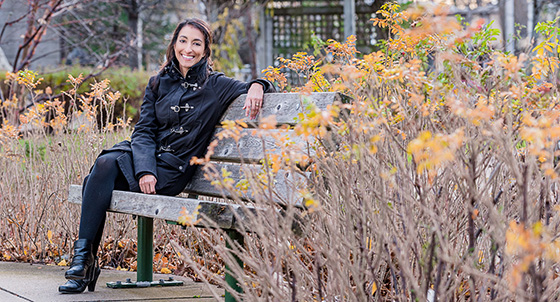
A flexible approach: Dr. Sabina Abidi (BSc’93, BA’94, MD’00)
Dr. Sabina Abidi (BSc’93, BA’94, MD’00) believes that flexibility is a crucial component to providing the care her patients need.
The Halifax-based psychiatrist puts this concept into practice every day, balancing her many roles through a combination of face-to-face visits across the Halifax Regional Municipality and tele-communication.
A balancing act
Dr. Abidi’s various roles put her at the helm of the IWK Youth Psychosis Program, Outpatient Services for the IWK Mental Health and Addictions Program, and Dalhousie’s Division of Child and Adolescent Psychiatry. She is also an assistant professor of psychiatry at Dalhousie Medical School, a clinician, and a researcher.
In order to fulfill her many responsibilities, the three-time Dalhousie graduate performs a remarkable balancing act.
A given day can include treating patients at the IWK Dartmouth Community Mental Health Clinic, identifying early signs of psychosis in children as young as six at the IWK Youth Psychosis Program, providing collaborative mental health care online for long-distance patients, or meeting a young patient for an appointment in a coffee shop.
Collaborative care
By relying on technology such as Telehealth, a secure video conferencing network used across Nova Scotia, Dr. Abidi is able to provide quality care to patients at a distance. The option to tele-commute frees the rest of her day for her local responsibilities, instead of being on the road for hours.
The technology further allows Dr. Abidi to engage not only with a patient, but also with their parents, teachers, primary care physicians or others who play a role in their care. This coordinated communication enables all those involved to provide collaborative mental health care that best suits the patient’s needs.
Dr. Abidi is eager to expand her work in collaborative care by working with primary care providers in small communities across the province to help equip them with the skills to recognize and treat youth psychiatric problems.
Putting these tools in the hands of family physicians, Dr. Abidi explains, would allow youth with moderate mental health problems to access the care they need locally, while ensuring the spots in tertiary care remain open for those requiring more resources.
Putting patients first
Another component of her flexibility centres on providing patients the care they seek in a comfortable environment. That philosophy is what brings Dr. Abidi to meet with young patients in coffee shops, schools or homes, instead of always relying on her IWK office.
“It’s important to kids and adolescents to decrease the emphasis on traditional face-to-face care,” says Dr. Abidi in an interview with Doctors Nova Scotia. “The traditional doctor-patient relationship that we’re used to doesn’t necessarily meet kids where they are at – and meeting kids where they are at is key to improving outcomes.”
Read more in “Dr. Sabina Abidi” on yourdoctors.ca.